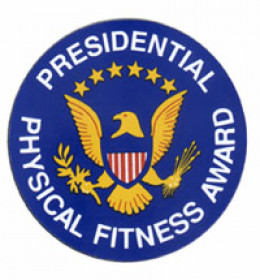Do you think government should play a role in health education for our children?
Do you think government should play a role in health education for our children?
With the obesity epidemic on the rise, do you think government should crack down on health education for our children in public schools? I often hear from parents that our children are not being taught health or physical education (PE) in their schools. I know that when I was in elementary and middle schools, it was mandatory to take health and PE. In fact, we even had the Presidential Fitness Challenge in which we had to pass annually or we failed PE. It was what gave me the love of fitness. Since many parents aren't teaching their children health, do you think these standards would help?
Or that the parents don't care enough to teach their children themselves. Honestly, this is one argument where I do believe the schools should be teaching health. I was homeschooled and my parents didn't teach me much about health either. In college, I took anatomy and health and learned a great deal that I wish I'd known earlier. So yes, I agree with that idea.
Thanks for commenting, Iburmaster. I also homeschooled my girls up through 8th grade. We used a variety of curriculum, but most of them offer health in which we used Abeka. For PE, they were on swim team, dance team, and softball league.
I know Abeka very well. But we used Saxon math. See, that's an easier PE than going to the YMCA every week. Swim team sounds fantastic. Why up until 8th grade? High school during homeschool is exactly like college. Drive to class and do your homework
We moved to a very rural area. My hubby was concerned about socialization. I lost the war with him, and I still wish I would have homeschooled them through high school. Like you said, they could have killed two birds with one stone (college).

He was actually concerned about it?! That was my mother's biggest worry, but it didn't bother me until college. In our area, there are plenty of homeschool groups to visit. Dual credit saved a ton on classes, but I loved high school.
Well, the problem with that is the same problem we're having now with standardized testing.
Some kids are going to fail the Presidential Fitness test and there's not a lot they can do about it. If you've got asthma, for example, you might not be able to run as far or as fast as your classmates. If you're a lot younger than the rest of your class (born right before the cutoff date, for example, or skipped a grade) you're going to be expected to meet standards for kids who are older (and stronger) than you are.
Perhaps if the standard (for all subjects, not just PE) were not only about raw achievement but also improvement? Say you start the year able to do, oh, fifty sit-ups in a minute and by the end of the year you're doing fifty-six, you pass. Or if you started the year able to do only fifteen, but by the end of the year you can do thirty, you still pass, 'cos you improved by 100%.
The problem with rating student achievement is that it's hard and expensive to do it in a meaningful way. This is why standardized testing stinks.Thanks for answering, Jeff. You have some great ideas for testing. I like the idea of ongoing assessments. That's what I do as a nutritionist and personal trainer as well. It's the fair way.
Yes, I think if our children were encouraged to live healthier and more active lives from a very young age, they may be more inclined to continue this kind of lifestyle into adulthood. I know not all children are capable of the same athletic abilities but teachers could be taught to teach P.E. at different levels to accommodate any health or physical limitations, but I guess this would be in a perfect world.
I agree, Celeste. I was out at Chinese dining once with my hubby. The family next to us were all large except one young son. I observed their plates, and he was the only one eating health. I don't know where his education came in but I liked this.
Unless you are talking some 2-3 hours per school day (not gonna happen, nor should it), phys.ed will do *diddly* for the growing waistlines of all Americans across both genders, all age groups, and even across socio-economic strata.
That - and phys. ed. is not this magic bullet of yesteryear. I was around during the PFC days. P.E. was sometimes fun, but mostly boring, and a mosh pit for bullying and unsupervised abuse. Gym is a fine component to an overall education and childhood wholesomeness blah blah blah, but it must be done right and in balance.
You cannot *teach* a healthy lifestyle. You have to live it. You can educate *about* it, and that is something parents can't do fully, not alone, anyway. They CAN set the example (and the rules!) as to what is eaten and how much activity the children do (chores, sports, charity, physical and outdoor play) et cetera, and set reasonable limits (not Draconian - that will backfire for LIFE!) regarding TV, computer, cell phone and app. use, and other sedentary leisure.
But, as the kids age - and especially those for whom academics is not a walk in the park, the homework load is going to get heavier and heavier - and with it, so will your children, unless it is counter-balanced in a fun, proactive, healthy way. But this has to start EARLY, because by the time some of our young ones are crying (or sleeping) at the kitchen table on hour 5 or 6 of high school homework, it will be too late to even TALK to them about health - 'cuz they have the hammer over their heads if they want to graduate.
I'm in Massachusetts - the land of MCAS. We are NOT going to standardize or test our way to better health.
This will not be solved in the schools. It is a societal problem. It is truly of cultural proportions and that is going to require an *evolutionary* change, which, by definition, takes time. But if overall health and wellness isn't a global priority, we're beaten before we start.Stan, why do you think that a "process of change" cannot benefit from schools requiring health and PE? Even 1 hour of education can be a part of that process at a different angle. As for me, PE was very active and well-taught. Just need good coaches.
Related Discussions
- 23
Do you think the government should send letters home notifying parents of their
by Dr Abby Campbell 12 years ago
Do you think the government should send letters home notifying parents of their children's obesity?Public schools mailing notices to parents about their child's obesity? That's right! It's a new government initiative. What are your thoughts?
- 73
Do you think home schooling your children is a good idea?
by steve-bc-ca 6 years ago
I was involved in a forum discussing whether teachers should be held accountable for a students success. I started thinking about the possibilities of home schooling, but I don't have any information on the subject and I noticed there were no hubs on the topic. What do you know about it and what is...
- 15
Do you feel that homeschooled children generally miss out on socialization?
by arizonataylor 13 years ago
Do you feel that homeschooled children generally miss out on socialization?
- 26
Should the government prioritize education more than the economy?
by alexandriaruthk 13 years ago
Should the government prioritize education more than the economy?The main focus of the government and peoples concern is the economy, but how about the education? Education is a value in that nobody can steal them away from you, it drives a nation to be productive. On the other hand, if the economy...
- 16
Do you think test scores are a good indication of a school's competency?
by Adamowen 12 years ago
Do you think test scores are a good indication of a school's competency?
- 67
How to stop or at least seriously curtail gun violence in schools
by Leland Johnson 7 years ago
The federal government could declare a state of emergency and post at least 2 well trained, armed personnel, either police or military, within our public schools. Gunmen attack soft targets. They like to assault "gun free zones." I believe 20 years of wrangling over...










